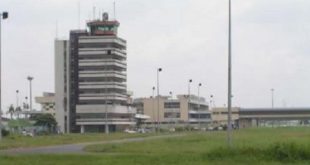- Cameroon’s Kribi Deep Seaport project, funded by China Eximbank, is set to enter its second construction phase next year
- The port will provide relief for current main port, Douala, as well as serve as a trading gateway for landlocked African countries
South China Morning Post | A small fishing town in southwest Cameroon is counting on Chinese funding to transform itself into a major Central African sea hub.
The Kribi Deep Seaport, on Africa’s Atlantic coast, is being built by Chinese state-owned China Harbour Engineering Company (CHEC), and largely funded by China Eximbank which has provided around US$1.48 billion over the past decade.
It is hoped the port will provide relief to Douala, Cameroon’s main port around 150km (93 miles) to the north, and that it will serve as a gateway for landlocked neighbours including Chad and the Central African Republic.
The first phase of the port was completed in 2014 and has been in operation since 2018. Pascal Balla Ondoua, director of studies, projects and cooperation for Kribi Port Authority, said the second phase of the project would make the port bigger and deeper.
“We hope that operations in the second phase will start in the first quarter of 2025,” Ondoua told the Post in an interview at the Africa CEO Forum in Kigali, Rwanda.
The second phase, once complete, will double the port’s capacity – with the hope that Kribi will then attract more transshipment cargo and larger vessels.
It is something the Cameroonian government is banking on, according to Ondoua.
The expanded port, improved road network and an industrial zone near the port should all work together to improve the financial fortunes of Kribi, which is currently best known for its palm-lined sandy beaches that attract tourists, and for its fishing industry.
Going by the schedule, Ondoua said: “CHEC will complete works at the new terminals by the end of the year and after that commercial activities will begin next year.”
The second phase of the project will see the quay line extended, with another 700m (2,296 feet) to be devoted to container traffic as well as storage areas spanning more than 30 hectares (74 acres).
As part of the expansion, CHEC is also building an aluminium terminal and a hydrocarbon terminal, additional buildings, extending roads and acquiring more handling equipment such as wharf gantries and park gantries.
There are also two offshore terminals used for the export of oil from Cameroon and Chad, and an offshore gas terminal for liquefaction and export of gas by Golar LNG and Perenco – liquefied natural gas producers in Cameroon.
“Our ambition is to become the logistics hub in the region. We already receive a lot of transshipment cargo destined to other ports,” Ondoua said. “When Gabon had issues last year, a lot of cargo was shipped via Kribi. But we also receive goods for Nigeria.”
Kribi port is one of the Belt and Road Initiative projects that illustrate a financing model gaining usage among Chinese companies and lenders, in which Chinese companies move beyond just engineering, procurement and construction (EPC) contracts to diversify into direct ownership and operations.
According to the China Africa Research Initiative (CARI) at Johns Hopkins School of Advanced International Studies, the Cameroon government initially intended to award the operation of Kribi port to a consortium of two French companies. But when Eximbank demanded that CHEC also participate, the Chinese contractor joined as a minor shareholder in the port operation joint venture with a 20 per cent stake.
CHEC, together with French group CMA CGM and its subsidiary Bolloré Transport & Logistics, were granted the funding and operational rights of Kribi Container Terminal for 25 years under a public-private partnership.
Over the past decade, Cameroon has borrowed around US$1.48 billion from China Eximbank to build the first and second phases of the port, as well as a major highway leading up to it.
China Eximbank is providing two loans worth US$674.5 million in all – a US$524.5 million preferential export buyer’s credit and a US$150 million concessional loan for the expansion of the port. It had advanced US$423 million for the building of the first phase.
A 2023 study by CARI said Chinese banks required Chinese contractor’s involvement in both construction and operation as a prerequisite for lending to overseas railway projects.
Ondoua said the Chinese company also built the Kribi-Lolabe highway to connect the port to other parts of the country. China Eximbank advanced US$385.8 million for the construction of the highway, which serves as an important traffic artery in the Kribi region.
“They are also helping us develop land at the port. They are good partners in developing our port,” Ondoua said, referring to CHEC. “Our cooperation with China already has good results.”
China-funded infrastructure across Africa force difficult decisions for its leaders
He said the first phase of the port had already attracted investors in cement, agribusiness and cocoa processing.
“We want to develop more spaces for investors,” he said, flagging a major plan to develop 1,500 hectares of land in the Kribi Industrial Zone.
The Kribi Port Authority has since signed memorandums of understanding with firms including CHEC, pan-African industrial zones developer Arise, and Tanger-Med, a Moroccan industrial port complex, to develop the Kribi Industrial Zone.
Ondoua said a number of other Chinese companies had shown interest in Kribi port.
“We have been receiving delegations of Chinese companies who want to set up factories,” Ondoua said.
“One of the main areas of development in our port is minerals, especially iron ore. One of the companies that will develop and manage iron ore is a Chinese company,” he said, referring to the massive iron ore projects near Kribi that have attracted Chinese businesses.
A subsidiary of the state-owned Chinese miner Sinosteel Corporation Limited is developing the Kribi-Lobe iron ore mine, just 40km from Kribi. In 2022, the Cameroonian government signed a US$680 million iron ore mining deal with Sinosteel to extract 10 million tonnes of iron ore each year for 20 years.
 CameroonOnline.org Cameroon news, Actualité Camerounaise, live Web TV & Radio, World News and a lot more
CameroonOnline.org Cameroon news, Actualité Camerounaise, live Web TV & Radio, World News and a lot more



